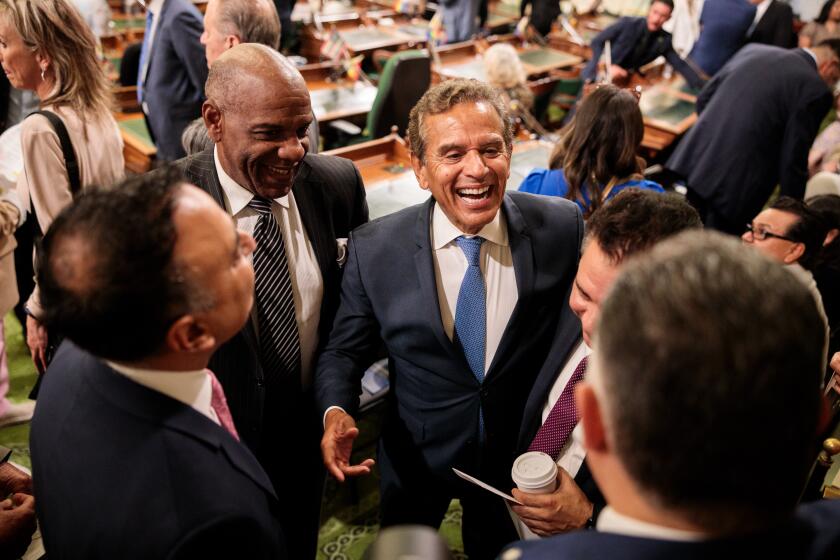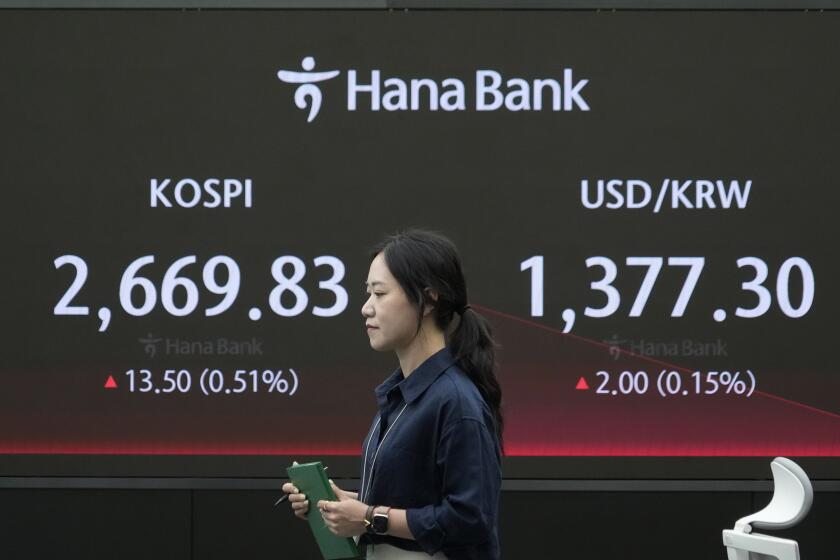Budding financial thinkers offer some winning ideas
Charles Clow has some advice for the Obama administration on how to get the U.S. out of the recession.
“The wheels here need to be greased,” Clow said. “People have to want to spend money again and that’s our problem -- they don’t want to spend money. We need to increase government spending and cut income taxes and payroll taxes and get money flowing.”
On Wednesday, Clow and three of his colleagues won $500 each and an all-expenses-paid trip to New York to visit the New York Stock Exchange, the Nasdaq exchange and the Federal Reserve Bank of New York for their analysis on how the global economic crisis began and what can be done about it.
But Clow, 18, and his friends Kenyon Christensen, 18, Laurie Shafer, 17, and Joshua Novins, 18, aren’t financial experts.
They’re high school students. And the four of them, from Centennial High School in Bakersfield, graduate today.
Together, they took first place in the Capital Markets Contest held at the Federal Reserve’s Los Angeles office and organized by the California Council on Economic Education and the CFA Society of Los Angeles.
“The difficult part of getting us out of this is we need to tell people that the reason we got into the recession is because they were spending money they didn’t have and because they were greedy, while still telling them that we need them to start spending again,” Clow said after his team’s victory over six Southern California high schools.
“That doesn’t make a lot of sense to most people, which is part of why this is so much fun. We can explain it.”
Being able to explain their views and back them up with research is the point of the contest, now in its fifth year, said Jim Charkins, executive director of the economics education council.
But getting teenagers engaged enough to display the level of financial literacy seen in the contest finals can be difficult, especially with a stigma of uncoolness lingering around economics, Charkins said.
“Overcoming that boredom is tough to do,” he said. “But what we do is we try to get the kids to start thinking about the choices they make and the cost of each choice, not only in an economic cost-benefit sort of way but in general.”
When economics is simplified so young people can relate the ideas to their own lives, learning about markets and financial planning can become exciting, said Brett Dobson, who teaches government and economics at Centennial High School and coached the winning team.
“It’s something teachers struggle with every day,” Dobson said.
The Capital Markets Contest begins with a 10-week stock trading challenge: Each team of four invests an imaginary $100,000 using a stock market simulator website, competing against other teams at their school to make the most money, Charkins said.
More than 1,200 students from 19 schools, most in the L.A. area, competed in the stock trading contest. Finalists were then selected based on the strength of the arguments they made in an essay on the current and future state of the economy.
Chris Braden didn’t compete in the finals of the Capital Markets Contest, but he made some noise in the stock-trading portion of the competition late last year by turning his imaginary $100,000 into $1.5 million before losing steam and ending with $600,000.
“Before all this, I didn’t really know what a stock was,” Braden said. “Now I’m on there every day, day trading; buying in the morning and selling in the afternoon. I’m hooked. I think I want to do this for a living.”
On Wednesday, Braden was cheering for his classmates from Goleta’s Dos Pueblos High School, who placed third in the Capital Markets Contest.
He also took home a prize for leading his team to the highest earnings in the stock-market simulation.
Braden said he had so much fun in the contest, looking to stock trading websites for daily advice, that he took a little money and opened an Etrade.com account.
“It’s a lot different when it’s real money that you’re putting into stocks,” he said. “Suddenly it’s a lot harder to take a risk.”
Again, Charkins said, that’s the point.
“Every choice a person makes has a cost, and if we can just teach these kids that fact, then that’s enough,” he said. “They don’t all have to become economists.”
nathan.olivarezgiles@latimes.com






